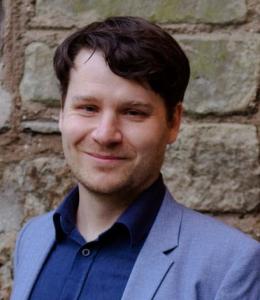
Dr Caleb Froehlich - orcid.org/0000-0002-7277-4254
IASH-CTPI Duncan Forrester Fellow, December 2022 - September 2023
Home Institution: University of St Andrews
Dr Caleb Froehlich (he/him) completed his PhD in Religion, Art, and Culture at the University of St Andrews in 2020. From 2021-2022, he was the Postdoctoral Researcher for the Templeton Religion Trust-funded ‘Investigating Art and the Sacred’ project at New College, University of Edinburgh, where he explored how audience experiences with sacred art at the 2021 and 2022 Edinburgh Festival Fringe enriched or extended their understanding of spiritual realities. His research interests include the intersection between religion, art, and culture, culturally engaged theology and biblical reception (with a focus on art and media).
His forthcoming book, provisionally titled Redefining Religious Experience in the Late Long Sixties (Routledge), examines how religious knowing is surreptitiously entwined in young Americans’ meaning-making processes with works of popular art, even after they have abandoned religion. He contributes to Transpositions, an award-winning open access journal, and has a growing list of publications, including an article in the Religion and the Arts journal, an edited volume of poetry, and a book chapter in the collected volume Annunciations: Sacred Music for the 21st Century (Cambridge: OBP, 2019). Dr Froehlich also works as an editor for De Gruyter’s Encyclopedia of the Bible and Its Reception.
Project Title: Five Objects for Art and Peacebuilding: Facilitating Constructive Relationships between Ukrainian Refugees and British Hosts
While the initial outpouring of public support to Ukrainians in the UK has been remarkable, there are already reports of a ‘concerning increase’ of relational breakdowns between Ukrainian refugees and their British sponsors. It is therefore paramount that local engagement with refugees builds compassionate and constructive relationships that will remain resilient in the face of domestic discontent and promote the peaceful co-existence of refugees and their UK hosts. Dr Froehlich’s project aims to facilitate this kind of local engagement in and around Edinburgh through cooperative art-making. Rather than focusing on artworks or artists, this project is organized around five tools and material-symbolic instruments of art-making which are prominent in Ukrainian folk culture or have been used by Ukrainian artists and artisans as ‘weapons of resistance’ against Russia – the knitting loom, the camera, the violin, the potter’s wheel, and the rolling pin. The project examines whether and how these and other associated art-making objects afford interactions for building constructive relationships between Ukrainian refugees and those in local faith-based communities through co-creative practice and process. In doing so, it will explore three primary research questions: What role do such objects play in developing compassionate and constructive relationships with Ukrainian refugees? How might they become a means of healing and visibility for refugees living in Edinburgh? And what insights might these objects provide for theologies and practices of hospitality in local churches?
